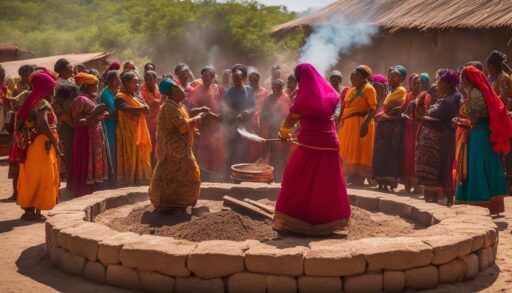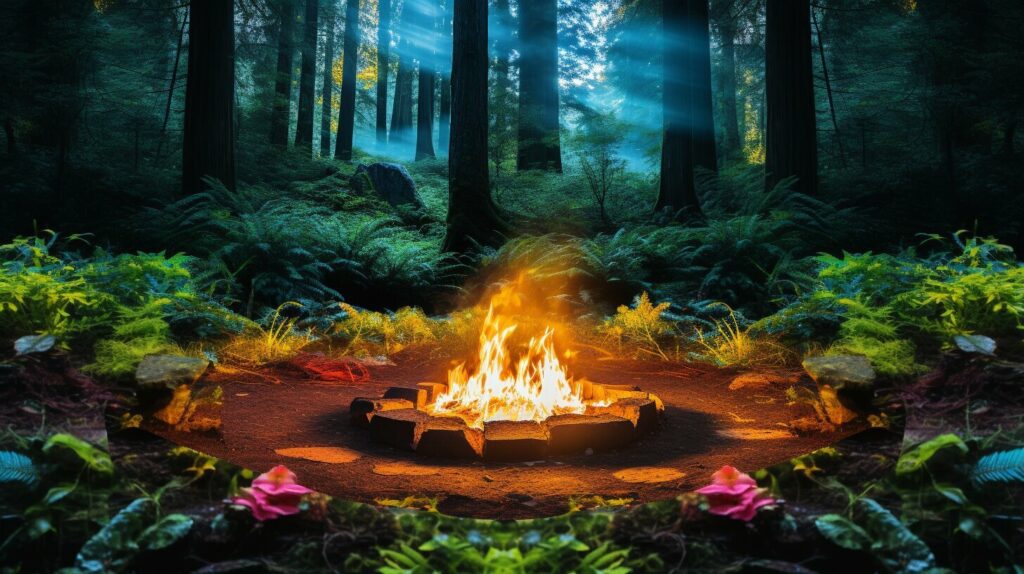Ancestral Spirits in African Traditional Healing

Immerse yourself into the mystical world of African traditional healing, where ancestral spirits play an instrumental role. This intriguing article unfolds the intricate relationship between health and spirituality, drawing on centuries-old practices deeply rooted in African culture. As you journey through the text, you’ll learn about the strong belief system where the spirits of ancestors are called upon to guide, protect, and intervene in the healing process. This exploration into the unique and awe-inspiring nexus of faith and medicine promises to leave you fascinated and enlightened.
Understanding the Concept of Ancestral Spirits
Ancestral spirits play an integral role in African traditional healing. To truly understand their role, you must first understand the general belief system surrounding these spirits.
Belief in the existence of ancestral spirits
In many African cultures, there’s a strong belief in the existence of ancestral spirits. This belief forms the core of their worldview and permeates every aspect of life. Ancestral spirits are viewed as beings that once belonged to the world of the living and have moved on to the spiritual realm upon death. But despite their movement to the spirit world, they are believed to maintain strong ties with their living descendants.
Difference between ancestral spirits and ghosts
While it’s easy to get confused between the concepts of ancestral spirits and ghosts, there are clear distinctions. In African cultures, ancestral spirits are venerated entities who provide guidance and protection to the living. They’re perceived as mediators between the living world and the spiritual world. On the other hand, ghosts are generally understood worldwide as restless spirits of the deceased, often associated with unresolved issues or inflicted punishments.
Role of ancestral spirits in influencing daily life
Ancestral spirits are seen as ever-present figures in the daily lives of people. It is believed that they play a significant role in influencing everything from personal decisions to community matters. They’re thought to bring blessings or misfortunes, depending on how they’re respected or appeased. People often seek their guidance through rituals and offerings, which strengthens the connection between the living and the spiritual world.
Ancestral Spirits and Traditional African Worldview
The African worldview is deeply connected to ancestral spirits. This connection permeates all aspects of life and brings a unique perspective on life, death, and the afterlife.
Interconnectedness of the living and the spiritual
In traditional African beliefs, the world of the living and the afterlife are not separate but deeply interconnected. It’s believed that the ancestral spirits have an almost omnipresent role in the life of the living, offering guidance, protection, and blessings. This connection is often nurtured through rituals and ceremonies, affirming the coexistence of both realms.
Respect and reverence for the ancestors
A crucial part of African traditional beliefs is the deep respect and reverence for ancestors. This comes from the belief that ancestral spirits continue to be a part of the family and the community, watching over their descendants, and helping navigate both personal and communal life.
Concept of life, death and afterlife in African traditions
In African traditions, life and death are merely transitions. Death is not regarded as an end but a shift from the physical to the spiritual realm. The afterlife is seen as a continuation of life, with the deceased joining the ancestors’ ranks and playing an instrumental role in the life of their living descendants.
Concept of Disease and Illness in Traditional Africa
Understanding the concept of disease and illness in traditional Africa is essential to understanding the role of ancestral spirits in health and wellness.
Physical and spiritual aspects of health
In traditional African beliefs, health and wellness are not just physical but also spiritual. Illness is often viewed as a sign of spiritual imbalance or displeasure from the ancestors, requiring not only physical healing but also spiritual appeasement.
Belief in spiritual causes of diseases and misfortunes
Most African societies attribute spiritual causes to diseases and misfortunes. It’s believed that diseases can result from curses, evil spirits, or even the wrath of the ancestors for neglecting cultural norms and rituals.
Role of community in health and wellbeing
Community plays a central role in health and wellbeing in traditional Africa. Collective responsibility is taken in caring for the sick and ensuring the overall health of the community, often involving communal prayers and rituals to invoke the goodwill of the ancestors.
Role of Ancestral Spirits in Healing
Ancestral spirits are seen as instrumental in the healing process in African cultures.
Perceived power of ancestral spirits in granting health and wellness
Ancestral spirits are believed to have the power to influence health and wellness. They’re seen as holding the ultimate control over the wellbeing of individuals and communities.
Ancestors as spiritual intercessors in healing processes
In the healing process, ancestral spirits are perceived as crucial intercessors. Through rituals and offerings, they’re appealed to intercede and restore health and wellness.
Restoration of the spiritual order through ancestral healing
Healing is seen as a process of restoring spiritual order. Whenever an illness strikes, it’s presumed that there’s spiritual disorder—either the ancestors are displeased, or evil forces are at play. Ancestral healing involves appeasement of the ancestral spirits and restoration of spiritual balance.
Traditional African Healers and Ancestral Spirits
traditional African healers play a crucial role in invoking the power of ancestral spirits during the healing process.
Selection and preparation of traditional healers
Traditional healers, also known as diviners or shamans, are typically chosen through ancestral calling or hereditary line. Their preparation involves rigorous training and initiation processes where they’re imparted with essential knowledge and skills to communicate with the ancestral spirits.
Communication with ancestral spirits during healing rituals
During healing rituals, traditional healers communicate with the ancestral spirits. They use various means such as drumming, dancing, chanting, and use of sacred objects to reach a trance-like state where they can interact with the spirits and seek their assistance in healing.
Ceremonial use of herbs, roots, and animal parts
Healing rituals often involve the use of herbs, roots, and animal parts. These are believed to have medicinal and spiritual properties, and their ceremonial use is thought to amplify the healing power of the ancestral spirits.
Examples of Ancestral Spirit-based Healing
There are several examples of how ancestral spirit-based healing is carried out in practice.
Sanctification and consultation rituals
These rituals involve the creation of sacred spaces for communication with the ancestors. The healers consult the ancestral spirits about the cause and remedy of the illness.
Ancestral veneration ceremonies
These ceremonies honor and appease the ancestors, seeking their protection and goodwill. They often involve offerings of food, drinks, and other symbolic tributes.
Rituals for pacifying angry spirits to restore health
When an ancestor’s displeasure is believed to be causing an illness, specific rituals are carried out to appease them and restore health. These rituals often involve sacrifices and pledges to uphold certain cultural practices.
Critics and Controversies Surrounding Ancestral Spirit-based Healing
Like all traditions and practices, ancestral spirit-based healing has both critics and controversies.
Western biomedical viewpoint on African traditional healing
From a western biomedical perspective, traditional African healing might seem unconventional. The belief in spiritual causes of disease and appeasement of spirits for healing doesn’t align with the scientific approach to medicine.
Interplay between modern medicine and traditional healing
There’s a growing recognition of the interplay between modern medicine and traditional healing. While some view them as conflicting, others see potential in their integration, giving patients a holistic treatment approach.
Ethical concerns and issues in animal and human sacrifices
Ethical concerns have been raised cases where animal or human sacrifices are involved. While the spiritual importance of these practices is understood, they often conflict with modern norms and rights.
Preservation and Adaptation of Traditional Healing Practices
Despite challenges, there is a strong effort to preserve and adapt traditional healing practices to modern times.
Efforts to safeguard traditional healing practices
Governments, cultural entities, and NGOs are increasingly working towards safeguarding traditional healing systems. They’re promoting research, documentation, and preservation of these practices.
Incorporation of traditional healing in modern healthcare
Incorporation of traditional healing in modern healthcare isn’t straightforward but has made some progress. Certain elements of spiritual healing now find a place alongside conventional medical practices in a bid to provide comprehensive patient care.
Importance of traditional healing in cultural preservation
Traditional healing practices form an integral part of the cultural heritage of many African societies. Their preservation thus goes hand in hand with efforts to promote and safeguard African cultures.

The Impact of Colonization and Christianity on Traditional Healing
Colonization and Christianity brought significant changes to traditional healing practices in Africa.
Shift in belief systems and healing practices
Colonization and Christianity challenged the indigenous belief systems and healing practices. Emphasis was placed on western biomedicine, marginalizing traditional healers and ancestral practices.
Resurgence of traditional healing in post-colonial Africa
Post-colonial Africa saw a resurgence in traditional healing. As the continent reclaimed its independence, there was a renewed interest in ancestral practices, reflecting in the resurgence of traditional healing.
Balancing Christian beliefs with ancestral veneration
Balancing Christian beliefs with ancestral veneration presents a unique challenge. Some have managed to harmonize the two, viewing the Christian God as the ultimate, with ancestors as intercessors.
Future Perspectives on Ancestral Spirits and Healing
Looking forward, ancestral spirits will continue to play a substantial role in African healing practices.
Continued relevance of traditional healing in modern Africa
Traditional healing practices aren’t relics of the past but continue to have relevance in many communities across Africa. Despite the advancements in modern medicine, many still turn to conventional ancestral practices for healing.
Challenges and opportunities in integrating traditional and modern healthcare
Integrating traditional and modern healthcare presents challenges, but also opportunities. While there’s a marked difference in approach, an integrated system could potentially provide more holistic, patient-centered care.
Interdisciplinary research on African traditional healing
Interdisciplinary research is essential to understand African traditional healing better. By incorporating anthropology, ethnobotany, psychology, and medical sciences, a comprehensive understanding of traditional healing practices and their potential contribution to modern healthcare can be achieved.
Ancestral Spirits African Traditional Healing
Exploring the rich tradition of Ancestral Spirits and African Traditional Healing reveals the intricate and deeply rooted practices among various cultures across Africa, particularly within the Zulu community. Here are a couple of comprehensive resources that delve into these practices:
- Encyclopaedia Britannica’s Entry on Sangoma: This resource provides an extensive overview of the sangoma, a highly respected healer within the Zulu community of South Africa. Sangomas diagnose, prescribe, and perform rituals to heal individuals physically, mentally, emotionally, or spiritually, addressing issues through divination, herbal medicine, and specific customized rituals. The role of ancestors (Amadlozi) is emphasized as they are considered actively involved in the world of the living, frequently seen as sources of illness to reprimand or guide the living towards moral and ethical living. The detailed explanation covers the traditional background, calling, initiation, and skills of a sangoma, including their role in counteracting witchcraft and the importance of achieving balance and harmony. For an in-depth understanding, visit: https://www.britannica.com/science/sangoma (Britannica).
- The Grace – Sangoma: Traditional Healer of Southern Africa: This article provides a comprehensive look at the roles of sangomas and inyangas in Southern Africa, highlighting their vital social, political, and healing roles within the community. It touches upon the distinction between sangomas, who primarily use divination for healing, and inyangas, who focus on medicines made from plants and animals. The piece also discusses the widespread belief in and reliance upon traditional healers in South Africa compared to Western-trained doctors, emphasizing the importance of harmony between the living and the dead and the various healing practices, including the use of ‘muti’ and ancestral spirits’ guidance. For further details, explore: https://thegrace.co.za/sangoma-traditional-healer-of-southern-africa/ (The Grace).
These resources offer a gateway into understanding the complex and spiritually rich practices of traditional healing and the role of ancestral spirits in African cultures, particularly within the Zulu society.
